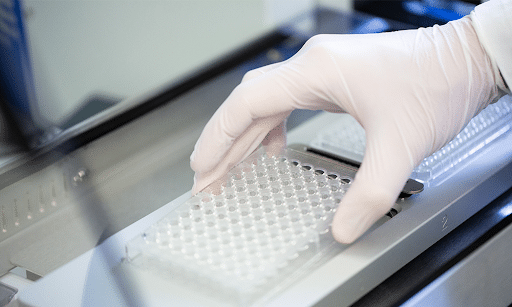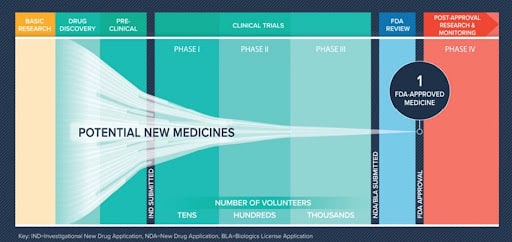
Artificial intelligence (AI) is already playing a major role in accelerating the development and use of medicine. While there are researchers and startups studying just about every potential use case for AI in the field, the main area of focus is drug discovery.
How is Drug Development Done Today?
The current methods of drug development are extremely inefficient, which is part of why designing a new drug is incredibly laborious and expensive. The entire process often takes over a decade and the average cost of bringing a new drug to market is over $2.5 billion.
The most popular method to find potential drugs is called high-throughput screening (HTS) and it is essentially a way to guess and check a massive batch of chemicals to see if any of them act like a medicine in vitro (outside of a living organism).

To start, researchers often devise a certain target, like a specific receptor from a cell’s surface that they know modulates disease. Then they screen millions of compounds with known structures to see if they do what the researchers want them to do. If they find a compound that does what they are looking for such as inhibit the receptor strongly (when it locks itself in the receptor so the intended signaling molecule can’t activate it).

Once a promising hit is discovered (which can take a lot of time, effort, and money itself), it is further tested to gauge its promise. Then it is studied in even more depth in the pre-clinical phase and if it passes, it moves into clinical trials. Only a minuscule fraction of hits end up as a new drug.
How Can AI Improve Drug Discovery?
There are a myriad of ways that AI can enhance or replace current drug discovery techniques. One of the most exciting for drug companies is its potential to completely replace expensive HTS with virtual algorithms. These algorithms would essentially simulate the physics (and thus the chemistry) of millions of interesting compounds.
The pharmaceutical industry already has an extreme wealth of data compiled from millions and millions of tested compounds from traditional HTS. AI algorithms are already being developed to parse this data to find new hits (potential drugs) at a fraction of the cost and effort.
Kantify, a biotech startup made up of a small team of experts in AI and computational biology, claims that it can reduce the time it takes to find hits from months and years down to hours. The great thing about this application is that the results can be easily tested by doing a single in-vivo test.
AI could also help speed up the step that often precedes HTS, target identification. This is when experiments are run to determine what the direct cause of a disease is. These targets could be genes, proteins, or even RNA. You may think that biologists have figured out how all proteins, genes, or RNA molecules affect certain medical outcomes, perhaps with the exception of those relating to the brain. This is far from the truth.
Google’s DeepMind AI unit has predicted the structures of over 200 million proteins, giving an idea of the incredible scale of biology on Earth. This includes proteins from about 1 million species, but there is a surprising amount of overlap between species. It’s no surprise that science hasn’t been able to work out the functions of every single one (or anything close).
AI also has the potential to reduce the failure rate of clinical trials by crunching large datasets to look out for potential problems such as unexpected side effects. This is particularly interesting for pharmaceutical companies because clinical development makes up about 50-58% of the cost of developing a new drug according to a 2021 study.
A successful clinical trial isn’t all that expensive ($40-72 million on average, depending on the type of drug) compared to the value of a successful, approved drug. However, about 90% of drugs fail the clinical trial process. This adds the cost of the many failed drugs onto the successful ones to keep the drugmaker profitable.
How Far Away Is AI From Revolutionizing Pharmaceuticals?
AI companies are already starting to change the pharmaceutical industry, though there is still much to be gained from the technology. One of the most exciting companies bringing AI into the industry is Causaly, a UK startup that just landed a $60 million Series B investment.
The startup is just 6 years old and it is already working with 12 of the world’s most important drugmakers as well as some of the largest companies in pharmaceutical research including Novo Nordisk, Regeneron, and Gilead. It’s also working with the Food and Drug Administration (FDA) and the National Institute of Environmental Health and Sciences.
Causaly has built a wide-ranging cloud platform that helps drug companies at most stages of drug development, including the ones mentioned above like target selection. It doesn’t have as bold claims as Kantify, saying that it can cut 10-15 years of research down to a few years, but it’s much more entrenched and it has already proven itself in the industry.
Causaly is far from the only AI company seeing success in the industry too. Recursion, a company built on a similar mission to enhance drug discovery with AI, just raised $50 million from Nvidia. Perhaps more importantly, Nvidia is lending its own platform to help Recursion succeed.
Recursion, which uses AI models for drug discovery, raised $50M from Nvidia and plans to train its models on Nvidia's platform using its own 23,000TB+ datasets (Reuters)https://t.co/KOVgw4p08thttps://t.co/kLYYPWzEW6
— Techmeme (@Techmeme) July 12, 2023
As this technology develops, especially when competition in AI drug discovery increases (which seems inevitable), medications may soon become exponentially cheaper to develop. This should hopefully pass savings on to patients, saving the world billions of dollars on medication. The rapid pace of development may also lead to the discovery of much better drugs on the market today as well, changing the face of medicine as we know it.
Related Articles:
Scientists Used AI to Discover New Antibiotic Effective Against Superbugs
What's the Best Crypto to Buy Now?
- B2C Listed the Top Rated Cryptocurrencies for 2023
- Get Early Access to Presales & Private Sales
- KYC Verified & Audited, Public Teams
- Most Voted for Tokens on CoinSniper
- Upcoming Listings on Exchanges, NFT Drops